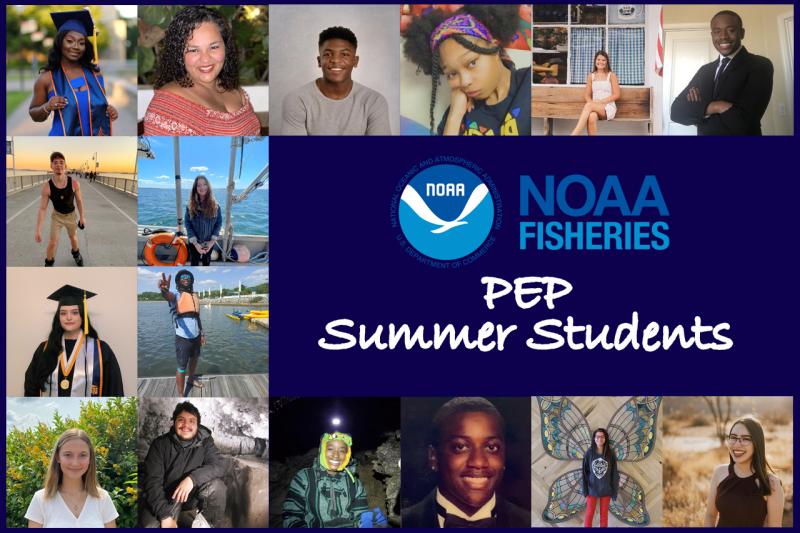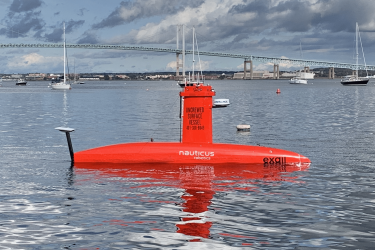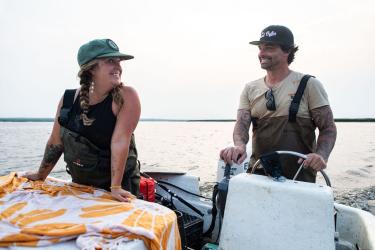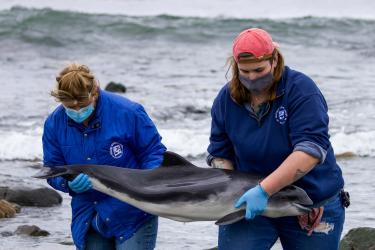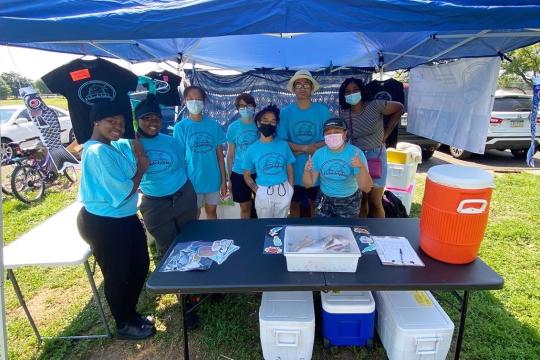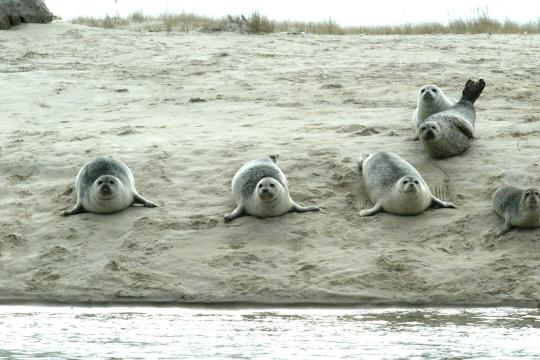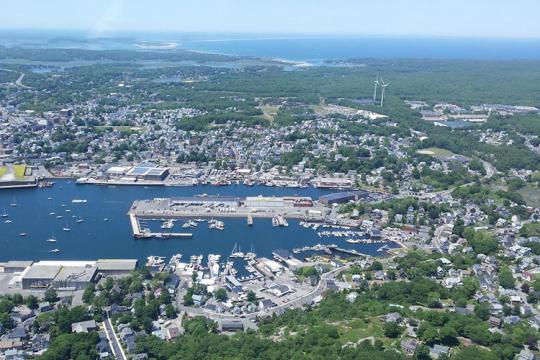Now in its 13th year, the Woods Hole Partnership Education Program (PEP) is hosting 17 students from populations underrepresented in marine and ocean sciences who want to spend a summer gaining practical experience in marine and environmental science. The students hail from 12 states, and 14 different colleges and universities in 13 states. Project topic areas range from invasive species, bacteriology, and sea turtles, to sea rise, Arctic climate change, and marsh ecology. There are technology projects focused on bioacoustics and robotic sampling, as well as social science investigations.
In each profile, students outline their project, why it's important, and—always the best part—insights they’ve gained into a marine science career during their time with us.
Christabelle Agyapong
Bio:
Hometown: Baltimore, Maryland
University: Morgan State University in Baltimore, Maryland
Major: Biology
Internship Mentor(s):
- Science Center: George Liles
- Other: Carolyn Tepolt, Woods Hole Oceanographic Institution
Project:
This summer, I’m studying the expansion of invasive European green crabs between Oregon, Washington State, and British Columbia, Canada by using genetic information and bioinformatics to analyze their genetic variations in these areas.
Insight:
My favorite part of my internship so far were the daily check-ins and poll questions that we did with the entire PEP cohort so we would get to know each more through our different answers. This internship helped me learn how to work independently and read through a scientific paper effectively. It also helped me learn how to use the command line and use Principal Component Analysis (PCA) in R to better understand genetic variations in invasive species.
Hannah Brunelle
Bio:
Hometown: Brewster, Massachusetts
University: Wheaton College in Norton, Massachusetts
Major: Environmental Science
Internship Mentor(s):
- Science Center: George Liles
- Other: Hauke Kite-Powell, Woods Hole Oceanographic Institution
Project:
My research this summer focuses on modeling the real estate value of properties around Duxbury Bay in Massachusetts, at risk of erosion and sea level rise. This included estimating the effect of distance from shore on the value of homes and comparing it with flood projection maps.
Insight:
I have learned many new skills during my internship. The most useful has been how I can make my goals into reality. I have learned that it is important to build your resume/CV and to start looking for jobs and graduate programs early. The PEP internship has shown me that I am capable and belong in the STEM field and I am forever grateful.
Lyric Carter
Bio:
Hometown: Austell, Georgia
University: Tennessee State University in Nashville, Tennessee
Major: Agricultural sciences
Internship Mentor(s):
- Science Center: George Liles
- Other: Jennifer Watts, Woodwell Climate Research Center
Project:
For my project, I’m studying the effects of fire disturbance and permafrost thaw on soil respirationーa process that transfers carbon from the soil and into the atmosphere.
Insight:
It’s been a great experience to learn data analysis skills with real data that could have an impact on future climate management. I hope that this data will be useful in informing ecological restoration efforts, both in the Alaskan tundra and boreal biomes and in other areas. I plan to use the data analysis, writing, networking, and research skills I’ve gained during my internship for future career endeavors.
Hector Delgadillo
Bio:
Hometown: Tulare, California
University: California State University, Long Beach in Long Beach, California
Major: Marine biology
Internship Mentor(s):
- Science Center: George Liles
- Other: Jennifer Watts, Woodwell Climate Research Center
Project:
I’m researching carbon fluxes in Alaskan boreal forests to understand what the main drivers of carbon loss are in these environments. Carbon fluxes mean carbon coming into the ecosystem versus carbon leaving it. Carbon comes into the ecosystem by photosynthesis, when plants take in carbon dioxide to grow. They eventually die or lose their leaves and store the carbon for years in the frozen soil. Climate warming may allow all this plant matter to thaw and break down, releasing lots of carbon dioxide into the environment.
Insight:
My favorite part of this internship was how interconnected my co-interns and I remained through group chats despite the virtual environment. Additionally, I loved the constant speakers and resources PEP provides us to excel. It’s been a constant reminder that we truly have the potential to succeed, even if we’re plagued with imposter syndrome or doubts. Through this and the exposure to diverse research fields, PEP prepares us for a career in STEM.
Xzayana Henderson
Bio:
Hometown: Pierre, South Dakota
University: Dakota State University in Madison, South Dakota
Major: Biology
Internship Mentor(s):
- Science Center: George Liles
- Other: Samuel Laney, Woods Hole Oceanographic Institution
Project:
Phytoplankton are microscopic, photosynthetic organisms in water environments like lakes and oceans around the world. Think of them as tiny plants, they need sunlight. For my internship, I’m studying digital images of phytoplankton taken in the winter of 2014 during an arctic ocean cruise surveying the Bering, Chukchi, and Southern Beaufort Seas. No one has studied this area in the winter and we don’t know how phytoplankton in this area survive in the winter.
Insight:
The PEP program helped me gain knowledge I wouldn’t have had living and going to college in South Dakota. Oceanographic sciences aren’t a focus where I go to school, but it is for PEP. The staff helped me understand how coding is useful in all kinds of science fields. However, my favorite part about PEP is the people. They gave me confidence to ask any question I have. They’re honest and have helped me realize there’s no wrong way to become a scientist. They boost strengths and encourage you to overcome your weaknesses. I am truly grateful for this experience.
Adrynne Jones
Bio:
Hometown: Detroit, Michigan
University: Eastern Michigan University in Ypsilanti, Michigan
Major: Bachelor's degree in biology
Internship Mentor(s):
- Science Center: George Liles
- Other: Ann Tarrant, Woods Hole Oceanographic Institution
Project:
I’m analyzing data on large copepods, Calanoides acutus and Calanus propinquus, in the West Antarctic Peninsula to learn about their life history strategies and the possible effects of global climate change on the Antarctic food web.
Insight:
This internship has been a wonderful experience. I learned about data analysis, research planning, and writing. It gave me the opportunity to explore my research interests and develop the skills I need for my own future research projects. It’s also helped me build a supportive network of people with similar interests and helpful insights.
Miles Jordan
Bio:
Hometown: Chandler, Arizona
University: Florida A&M University in Tallahassee, Florida
Major: Marine and environmental sciences
Internship Mentor(s):
- Science Center: George Liles
- Other: Meagan Eagle, U.S. Geological Survey
Project:
For my project, I’m using existing data from Sage Lot Pond on Cape Cod, Massachusetts, to investigate trace metal cycling within a salt marsh. I’m also doing literature reviews to see how other scientists have studied trace metal cycling in salt marsh subterranean estuaries and provide context for other fluxes we see in oceans, rivers, hydrothermal areas, and the atmosphere.
Insight:
Working with Dr. Meagan J. Eagle has been a great experience. I’ve had the opportunity to learn data analysis skills via RStudio and simulate real data that could have an impact on future management of salt marshes. I hope that this data will be useful in informing ecological restoration efforts, both of Sage Lot Pond and in other salt marshes. I plan to use the data analysis, writing, and research skills I have gained for future research projects.
Jabari Lottie
Bio:
Hometown: Denver, Colorado
University: Morehouse College in Atlanta, Georgia
Major: Biology
Internship Mentor(s):
- Science Center: Jennifer Turek
Project:
I’m creating a spectrogram analysis of anthropogenic and marine animal sounds that will be placed on NOAA Fisheries’ Sounds in the Ocean website.
Insight:
As an underrepresented minority in STEM, I’ve often felt discouraged and isolated as a young black male scientist interested in marine and environmental sciences. My PEP internship has given me a place to find and set my academic goals and feed my ambitions. It shows a wide range of jobs and focuses that alter the way I see my future. They’ve given us the tools, assistance, and experience to help us build our confidence and work with passion.
Xavier Manning
Bio:
Hometown: Yonkers, New York
University: Howard University in Washington D.C.
Major: Environmental science
Internship Mentor(s):
- Science Center: George Liles
- Other: Christopher Neill, Woodwell Climate Research Center
Project:
My research project focuses on the Coonamessett River, a three-mile long rural river in Falmouth, Massachusetts. I’m analyzing precipitation, river water discharge, and nitrogen concentration data to help determine primary sources of nitrogen into the river as well as the effects of recent restoration projects.
Insight:
Although my internship is mainly virtual due to the pandemic, it still gave me a great opportunity to improve my data analysis skills, practice valuable coding language, and learn about environmental mechanisms in river systems.
Jessica McLaughlin
Bio:
Hometown: Dix Hills, New York
University: University of Rhode Island in Kingston, Rhode Island
Major: Ocean engineering
Internship Mentor(s):
- Science Center: George Liles
- Other: Anna Michel, Woods Hole Oceanographic Institution
Project:
I’m helping to develop the “sipper” system for the autonomous collection of water samples on a robotic platform. Water samples are collected in separate capture units and allow a range of environmental measurements to be collected and analyzed. The primary steps include constructing and assembling components in a 3D modeling software program and identifying useful off-the-shelf parts. From there, rapid prototyping can be done so the system can be tested and adapted. Capture units vary in size since water collection often occurs over intervals of minutes to hours or programmed to collect at set depths.
Insight:
By participating in the PEP program and getting to work on this project I've been able to expand my engineering knowledge into a more scientific context! This internship has allowed me to make great friends all over the nation with similar passions as myself. Despite being partially virtual, my research project has continued to be very hands-on and I gained irreplaceable engineering experience, connections, and technical skills.
Derrick Richardson
Bio:
Hometown: Lithonia, Georgia
University: Hampton University in Hampton, Virginia
Major: Marine and environmental science
Internship Mentor(s):
- Science Center: George Liles
- Other: Julie Huber, Woods Hole Oceanographic Institution
Project:
I’m annotating the genome of Methanocalculus natronophilus, a bacteria species able to live in alkaline environments, to determine its functional gene repertoire, metabolic pathways and processes, and evolutionary relationships. My projects will help scientists understand how to grow this organism in the lab and examine its adaptation to multiple extremes in the natural world.
Insight:
My favorite part of this internship was the interaction with my peers and the open-arms assistance from PEP staff. It helped me develop life-long skills as a person and as a scientist, and provided important connections to prosper in science. I learned how to code with R, use Kbase to analyze genomes, create a well-presented scientific paper and poster, and how to communicate with my group and PEP staff better. I also learned that there’s a lot of opportunities within PEP and there are people who can help set your career path and be a friend for life.
Mya Rufus
Bio:
Hometown: Baltimore, Maryland
University: University of Maryland Eastern Shore in Princess Anne, Maryland
Major: Environmental marine science
Internship Mentor(s):
- Science Center: George Liles
- Other: Elizabeth Pendelton, Erika Lentz, Travis Sterne, U.S. Geological Survey
Project:
For my project, I’m analyzing sea-level rise data for coastal areas in Massachusetts and testing the accuracy of the classification system used to assess hazard level. Ultimately, this project will help inform decision makers about the condition of the coastal region.
Insight:
It's been exciting to use my analysis skills to look at data in real time and learn about other fields of science such as oceanography. I hope the data from my project can be used to make better decisions about coastal management in Massachusetts. Hopefully this will include green infrastructure. I plan to use the data analysis, research, and writing skills that I’ve gained from his experience for future research projects.
Christopher Sandoval
Bio:
Hometown: El Paso, Texas
University: University of Texas at El Paso in El Paso, Texas
Major: Bachelor’s degree in environmental science
Internship Mentor(s):
- Science Center: Joshua Hatch
Project:
For my project, I’m processing and analyzing data collected from satellite tags deployed on loggerhead sea turtles to study migration patterns in Mid-Atlantic waters.
Insight:
Being part of PEP 2020 and PEP-II 2021 gave me data analysis, coding, and networking skills. This experience helped me understand the importance of having the potential and to push myself to achieve my goals and to support others to do the same. I hope my project helps scientists better understand loggerhead sea turtle migration patterns and how climate change might impact those patterns. As I progress into a career, I hope to one day help and motivate future young scientists the way I have as a student and PEP intern.
Andrea Regan Scott
Bio:
Hometown: St. Pauls, North Carolina
University: University of North Carolina at Pembroke in Pembroke, North Carolina
Major: Bachelor’s degree in biology
Internship Mentor(s):
- Science Center: Brian Stock
Project:
For my project, I’m analyzing the abundance and diversity of fish species found around the Hawaiian Islands. This data was collected by recreational divers participating in the Reef Environmental Education Foundation’s citizen science program called Volunteer Fish Survey Project.
Insight:
I’ve gained a lot of knowledge and experience during my internship. I’ve learned about common and uncommon fish species found in Hawai’i and how to display this information using the R programming language. Hopefully, my project will be used to help identify locations that could be considered for marine protected area designation. I’m very grateful for the skills I’ve learned during this internship and I know I’ll use them in the future.
Rhegan Thomason
Bio:
Hometown: El Paso, Texas
University: University of Texas at El Paso in El Paso, Texas
Major: Bachelor’s degree in biology
Internship Mentor(s):
- Science Center: Kim Bastille, Kim Hyde, and Scott Large
Project:
I’m creating a data workflow to incorporate National Estuarine Reserve Research System (NERRS) data into the State of the Ecosystem report produced by the Northeast Fisheries Science Center’s Ecosystem Dynamics Assessment Branch. Hopefully, by including information on water quality and climate indicators in estuarine habitats, we can show how changes in these habitats could impact fisheries.
Insight:
It’s been great to delve into R and develop a better understanding of data analysis. It’s also been great to learn about how certain things like chlorophyll, dissolved oxygen, etc. play such big roles in these environments! I hope that after all this data is compiled, the workflow I created is helpful and can be used in future State of the Ecosystem reports.
Angela Trejo
Bio:
Hometown: El Paso, Texas
University: University of Texas at El Paso in El Paso, Texas
Major: Bachelor’s degree in environmental science
Internship Mentor(s):
- Science Center: George Liles
- Other: Hauke Kite-Powell, Woods Hole Oceanographic Institution
Project:
I’m examining and assigning economic values to ecosystem services in the Florida Keys. I’m also looking at climate change predictions on sea level rise and ocean acidification to develop estimates on how those ecosystem services may change in the future.
Insight:
Working in the Marine Policy Center has helped me learn about the research that goes into environmental policy. This internship taught me how to think about environmental problems from a new perspective and gave me valuable data collection, coding, and mapping skills.
Tiffany Windolz
Bio:
Hometown: Cleveland, Oklahoma
University: Oklahoma State University in Stillwater, Oklahoma
Major: Environmental science
Internship Mentor(s):
- Science Center: George Liles
- Other: Anna Virkkala and Sue Natali, Woodwell Climate Research Center
Project:
For my project, I’m analyzing data to evaluate the representativeness of terrestrial carbon flux sampling sites across the Arctic and determining gaps in site distribution.
Insight:
Participating in this project helped me to gain new and strengthen my existing research skills. It gave me the opportunity to use real data and learn how to use various data analysis tools. I hope the findings from my project contribute to bridging knowledge gaps in carbon fluxes and the overall carbon balance of the Arctic.
For more information, please contact Heather Soulen.
